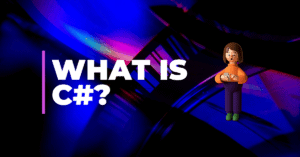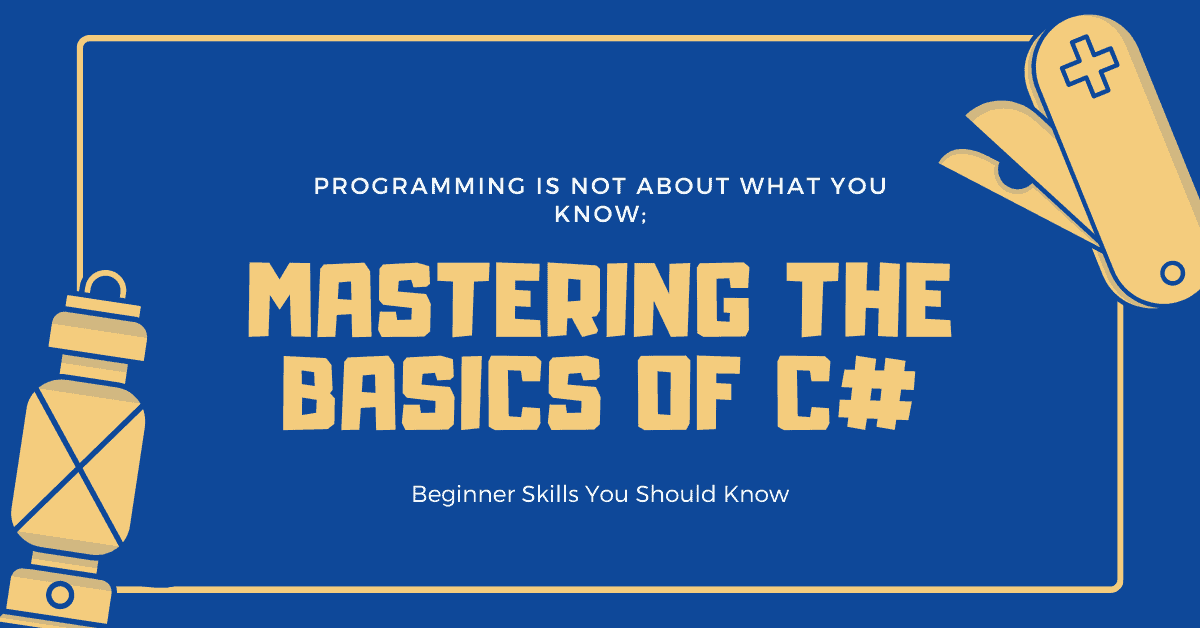Are you interested in programming and looking to expand your skillset? If so, C# (pronounced “C sharp”) might be just the language for you. Developed by Microsoft, C# is a versatile and powerful programming language that has gained popularity among developers in recent years. Whether you’re interested in building desktop apps, web services, mobile apps, or even machine learning models, C# has a lot to offer.
In this article, we’ll take a closer look at C# and explore its many features and applications. We will start with a brief overview of the language and its history, and then dive into some of its key features and benefits. Along the way, we will also discuss some practical examples of how C# can be used to build real-world applications.
So whether you’re a seasoned developer looking to expand your knowledge, or a newcomer to the world of programming, this article will provide you with a comprehensive guide to C# and its many applications. Let’s get started!
Mastering the Basic of C# Programming Language

What is C#
C# (pronounced “C sharp”) is a modern, object-oriented programming language that was developed by Microsoft. It is designed to be simple, efficient, and versatile, and is used to build a wide range of applications, including desktop applications, mobile applications, and web applications.
C# is a widely-used programming language developed by Microsoft that enables developers to build robust and scalable applications for various platforms such as desktop, web, mobile, and cloud. With its simple syntax, extensive library, and easy-to-use features, C# is a powerful and versatile language that is popular among developers of all levels. Learn more about C# and its applications in this comprehensive guide.
C# was first introduced in 2000 as part of Microsoft’s .NET framework, and it has since become one of the most popular programming languages in use today. It is similar in syntax to other C-style languages, such as C++ and Java, and it includes features like garbage collection, type safety, and automatic memory management.
Some of the key features of C# include its support for object-oriented programming concepts like classes, interfaces, and inheritance, as well as its support for LINQ (Language Integrated Query), which allows developers to easily query and manipulate data in a wide range of formats. Additionally, C# includes support for asynchronous programming, which allows developers to write efficient and responsive code for tasks like web requests and user interfaces.
Why Use C#
There are several reasons why someone might choose to use C# for their programming projects:
- It’s versatile : C# can be used to create a wide range of applications, from desktop apps to mobile apps to web apps. This versatility makes it a popular choice for developers who want to build different types of applications.
- It’s easy to learn : C# was designed to be a simple language to learn, especially for developers who are already familiar with other C-style languages like C++ and Java. The syntax is clear and concise, and there are many resources available online to help developers get started.
- It’s efficient : C# is a compiled language, which means that code is translated into machine code before it’s executed. This results in faster performance than interpreted languages like Python and JavaScript.
- It’s well-supported : C# is developed and maintained by Microsoft, which means that it’s well-supported and has a large community of developers who use it. This also means that there are many resources available for learning and troubleshooting issues.
- It’s secure: C# includes features like type safety and garbage collection, which help to prevent common programming errors like memory leaks and buffer overflows. Additionally, C# has built-in support for cryptography, making it a good choice for applications that need to handle sensitive data.
Overall, C# is a versatile, efficient, and well-supported programming language that is a good choice for many different types of project
Basic Syntax of C#
Here’s an example of the basic syntax of C# with a “Hello, World!” program:
using System;
namespace HelloWorld
{
class Program
{
static void Main(string[] args)
{
Console.WriteLine("Hello, World!");
}
}
}
Let’s break down what’s happening in this code:
- The
using System;statement at the beginning of the code is an example of a using directive. It allows us to access classes and methods from theSystemnamespace without having to fully qualify them in our code. - The
namespace HelloWorldstatement declares a new namespace calledHelloWorld. A namespace is a way to group related classes and other types together. - The
class Programstatement declares a new class calledProgram. This class contains theMainmethod, which is the entry point for our program. - The
static void Main(string[] args)statement declares theMainmethod. This method takes an array of string arguments (args) and returns nothing (void). - The
Console.WriteLine("Hello, World!");statement inside theMainmethod uses theConsole.WriteLine()method to print the string “Hello, World!” to the console.
When you run this program, you should see the output “Hello, World!” printed to the console.
The “Hello, World!” program is a simple but important program that is often used as a first example for learning a new programming language. It helps developers get familiar with the basic syntax and structure of a programming language and the tools used to run and test code.
Advantages of C#:
- Modern and powerful language: C# is a modern language that provides a wide range of features, including garbage collection, type safety, and automatic memory management.
- Cross-platform support: C# can be used to develop applications that run on a variety of platforms, including Windows, Linux, and macOS.
- Wide range of applications: C# can be used to develop a wide range of applications, from desktop applications to web applications, games, and more.
- Large community: C# has a large community of developers who contribute to open-source libraries, provide support, and share knowledge.
- Integration with .NET framework: C# is integrated with the .NET framework, which provides a rich set of libraries and tools for building applications.
- Easy to learn: C# syntax is similar to other C-style languages, such as Java and C++, which makes it easy to learn for developers who are already familiar with these languages.
Disadvantages of C#:
- Limited portability: While C# can run on a variety of platforms, it is still primarily associated with the Windows operating system.
- Learning curve: Although C# is easy to learn for developers who are already familiar with C-style languages, it can be challenging for beginners to learn.
- Dependency on Microsoft tools: C# is tightly integrated with Microsoft’s .NET framework, which can limit its flexibility and make it less appealing for developers who prefer open-source tools.
- Memory management: While automatic memory management is a strength of C#, it can also lead to performance issues in certain scenarios.
- Performance limitations: While C# is a performant language, it may not be the best choice for applications that require extremely high performance or low-level system access.
Overall, C# is a powerful and widely-used language that has many advantages for developers building modern applications. However, it may not be the best choice for all use cases, and developers should carefully consider the strengths and weaknesses of the language before selecting it for a project.
Application of C#
C# is a popular programming language that is widely used for developing a variety of applications. Some of the common applications of C# include:
- Desktop Applications: C# can be used to develop desktop applications using the Windows Presentation Foundation (WPF) or Windows Forms (WinForms) frameworks. These applications can be used for various purposes such as accounting, inventory management, and more.
- Web Applications: C# can be used to develop web applications using the ASP.NET framework. This allows developers to create dynamic and interactive websites that can communicate with databases and other web services.
- Mobile Applications: C# can be used to develop mobile applications using the Xamarin framework. This allows developers to create native mobile applications for iOS and Android platforms using a single codebase.
- Video Games: C# is also used in game development with the Unity game engine. This allows developers to create 2D and 3D games that can run on various platforms such as Windows, macOS, Linux, iOS, and Android.
- Cloud Computing: C# is used for cloud computing with the .NET framework. This allows developers to create scalable and high-performance cloud applications that can be deployed on the Microsoft Azure platform.
- Machine Learning: C# is also used in machine learning with the Microsoft Cognitive Toolkit (CNTK). This allows developers to create deep learning models for various applications such as image recognition, speech recognition, and natural language processing.
Overall, C# is a versatile language that can be used for a wide range of applications, making it a popular choice among developers.
“Programming is not about what you know; it’s about what you can figure out.” – Chris Pine

1 thought on “Introduction of C# Programming Language”